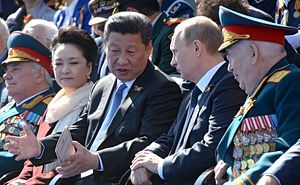On May 9, tanks, troops, missile launchers, and even cavalry filled Moscow’s Red Square, in what RT called the largest military parade in Russian or Soviet history since World War II. The grand parade, complete with bombers and fighter jets flying overhead, was held to celebrate the 70th anniversary of Germany’s surrender to the Allied powers. Watching the event alongside Russian President Vladimir Putin was China’s president, Xi Jinping. With Western leaders from Germany, France, the United Kingdom, and the United States choosing not to attend, Xi and Putin’s solidarity was a clear sign of Russia and China’s growing convergence.
However, Xi was far from the only foreign leader in attendance. As Katie Putz noted for The Diplomat, top leaders from Kyrgyzstan, Tajikistan, Kazakhstan, and Turkmenistan were all present , as were the presidents of India and Vietnam. The parade itself was also international, with soldiers from Azerbaijan, Armenia, Belarus, Kazakhstan, Kyrgyzstan, Tajikistan, India, Mongolia, Serbia, and China all taking part.
Still, Xi was clearly the guest of honor. He and his wife, Peng Liyuan, were seated to Putin’s right during the parade. Putin also made a point of particularly noting China’s contributions to the war effort. In a speech at the parade, Putin noted that China was “the main front in the fight against militarism in Asia.” China, Putin said, “just like the Soviet Union, lost many millions of people in this war.”
As expected, Putin also confirmed his plans to attend China’s own end-of-WWII military parade, to be held September 3 in Beijing.
For both Putin and Xi, standing together in remembrance of Victory Day marked another salvo in the battle over historical credit for the Allied victory. After a meeting with Xi, Putin emphasized that Russia and China suffered the heaviest casualties during the war and made great contributions to the eventual victory. Now, both countries will defend the legacy of their wartime efforts against all critics. “Now together we stand against any attempts to rehabilitate Nazism and militarism, attempts to falsify history,” RT quoted Putin as saying. Both Russia and China complain that their historical contributions to the war are often under-appreciated due to modern-day tensions with the other Allied powers.
Both countries have also laid claim to being defenders of the post-war order. Xinhua noted that the two leaders “vowed to defend [the] history of World War Two and safeguard world peace and international justice.” China in particular has been vocal about warning that Japan’s defense reforms, including the revised U.S.-Japan cooperative defense guidelines, are a threat to the post-war international order. Russia, meanwhile, wants to use the anniversary of WWII to fight back against Western attempts to isolate Moscow over its role in the Ukraine crisis, particularly the annexation of Crimea.
Besides their joint remembrance of history, Putin and Xi signed agreements further linking their countries’ strategic and economic development. Most notably, they agreed to formally link the Russian-led Eurasian Economic Union (EEU) with China’s vision of a Silk Road Economic Belt, linking China to the Middle East and Europe via Central Asia. “The integration of the Eurasian Economic Union and Silk Road projects means reaching a new level of partnership and actually implies a common economic space on the continent,” Putin said, according to RT. As a sign of that cooperation, China agreed to invest $5.8 billion to extend the Moscow-Kazan high speed railway into China.
Russia’ Gazprom and China National Petroleum Corporation also signed an agreement outlining the basic framework for China to begin receiving Russian natural gas through the “western route” (also called the Altai route). In May 2014, China and Russia inked a $400 billion deal paving the way for China to import Russian gas through the “eastern route” — the new western route would bring an additional 30 billion cubic meters of gas per year to China. The route will involve the construction of three new pipelines, stretching from the Nadym and Urengoy gas fields in western Siberia to Xinjiang province in western China.
Once completed, Gazprom’s CEO previously told reporters, “the volume of [Russian] gas deliveries to China can exceed the current volumes of export to Europe.” That would be a crucial step in weaning Russia off its dependence on Europe as an export market.
































